
For Traditionalists, A Time To Listen
by Kevin M. Tierney
We may be mediocre, but with our gifts and the sacraments, we traditionalists look to rise above mediocrity. We only ask a chance a chance to let us do so.

We may be mediocre, but with our gifts and the sacraments, we traditionalists look to rise above mediocrity. We only ask a chance a chance to let us do so.
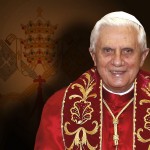
If they really want to help with these misunderstandings, the first thing they must do is the thing they will be least inclined to do: drop the moniker “radical traditionalist” and “radtrad” entirely. At best the phrase is a relic of a time that is no longer relevant. At worst, the term is creating animosity and perpetuating a growing sense of tribalism within Catholicism, especially in America.

What Catholics typically call “the First Pentecost” was actually a New Pentecost itself.

In this column I have frequently referenced findings about the dismal way in which many Catholics look at the sacraments. I think the problem is more than just the usual ranting and ravings about a liberal church, how horrible things are after Vatican II, true as all these clichés are. Instead the problem stems from […]

By the time this column is published, this author will have participated in the sacrament of marriage. While I do not know what the future has in store for me, I do believe that the experiences I had in the past 14 months (our time of engagement) have been God preparing me for the married […]

Have you heard about how America is an evil nation, opposed to God, and destined to be judged? Or how about how rotten the majority of the Catholic Church is for its lack of fidelity to the Gospel, and how God will judge them for that?

Wrapping up our series on the sacrament of confession, I’d like to deal with what I feel to be are the two most important parts. Frequently two questions are asked with this sacrament: What should we confess, and how often should we confess it? Due to poor catechesis (or worse) there are some who advocate that you should […]

If we want to solve the crisis of the confessional, we need to begin actually teaching these principles, and begin applying them in our own confessions. In many cases, this will require a fundamentally new outlook in the way we approach this sacrament. Yet it is only fitting, as the sacrament provides us a new way to live our life.

One of the greatest obstacles to presenting the Sacrament of Confession is exposing perfectly good Catholics to a worldview they are completely unfamiliar with.
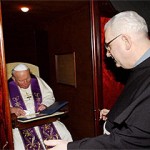
I would like to look at the matter from a different angle. I don’t really want to focus on a biblical rationale for every aspect of the sacrament of confession, not yet at least. Instead, I’d like for us to ponder why it is fitting that God chooses to use priests in the forgiveness of sins through the confessional.

In my last column, we began covering the sacrament of confession by stating that modern Catholicism suffers from a crisis of the confessional. Here on this site, on social media and in emails, readers have shared their thoughts with me on why this is so. According to the wisdom of the crowds, the biggest problem […]

Why did future saints like Blessed John Paul II go to confession on a weekly basis, sometimes even more frequently? Why did Archbishop Fulton Sheen recall with delight how the nuns whose confessions he heard did not spare their venial sins in the confessional, even though Church law only requires the confession of mortal sins?
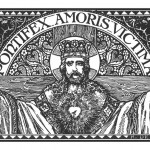
When the sacrament of baptism is discussed, much attention is placed upon the fact that we share in Christ’s offices of Priest and Prophet. Little attention is paid (especially here in the land of democracy) to the third office we are enrolled in: that of King. This truth should be a source of great shame […]

Yet if the impulse is noble, then that means there’s a hint of truth to this. So why the emphasis on the smallest bits of liturgical discipline? Why nitpick? In short, we are trying to be like the just servants in the parable of the talents.

In addition to sharing in Christ’s priesthood in baptism, the Catechism also tells us that we share in Christ’s prophetic office. The purpose of a Prophet (and hence Christ’s Office of Prophet) is something that is frequently misunderstood within Christianity today. The average answer will be that a prophet is essentially a divine fortune teller […]

A very wise priest is fond of starting all his discussions on the sacraments with the following fundamental truth. When teaching on the sacraments, we must remember that nobody encounters God without being fundamentally changed. In the Old Testament the names of individuals were changed. Moses’ face became as bright as the sun, and Elijah […]

If there is one thing about the Holy Spirit, he loves to throw a curveball. When white smoke appeared, Fox News’ Megyn Kelly and some wannabe pundit (whose name escapes me) were spending their time talking about how we were going to get a pope who was younger to help appeal to the masses. Or […]

When we consider the Sacrament of Baptism, two things become readily apparent. The first is how important baptism is in the Scriptures. Out of all the sacraments, none are foretold more than the sacrament of Baptism. (See Gen 1:2, Ez 36:25, 2 Kings 5:10-15, Is 1:16 to name but a few examples.) The other is […]
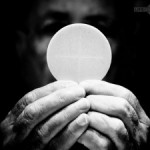
We understand the sacraments as “visible signs of an invisible reality.” While this is true, it really doesn’t tell us much about the sacraments. A visible sign of what? What is the reality? The questions (and answers!) contemporary Catholicism provides are clearly not satisfying.

I am of the opinion that we cannot develop a proper evangelization and theology centered around the sacraments because of the way we currently practice our faith. Any proper evangelization begins at home, and we need to take a better look at some realities of our faith.

True as they all are, their answers are incomplete. They are means, not the end. Why does God wish to “marry us?” What is the purpose of God providing peace? As always, the answer may be found within the Scriptures

I think we Catholics approach the sacraments from a flawed analysis. We view them as mere “booster shots” for the already holy. So long as we are without mortal sin, we go to the sacraments, get our booster shot of infused grace, and we become holier. While there is certainly this aspect to the sacraments, there needs to be a lot more to the sacraments if we are taking the Biblical, historical, and magisterial evidence seriously.

If you ask any priest, he will tell you that one of the biggest dangers attacking healthy marriages in the Church today comes from pornography. When you consider that kids from healthy Catholic marriages are a lot likelier to develop a strong faith, this is a problem that affects more than just the individual couple; it impacts […]
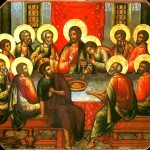
When discussing the Catholic priesthood, many questions need to be considered. First and foremost, we must ask ourselves where the idea of the priesthood comes from in the Scriptures. Contrary to the ideas of our Protestant brethren, the idea of the ministerial priesthood is clearly enunciated within the New Testament. Indeed, if there is no […]